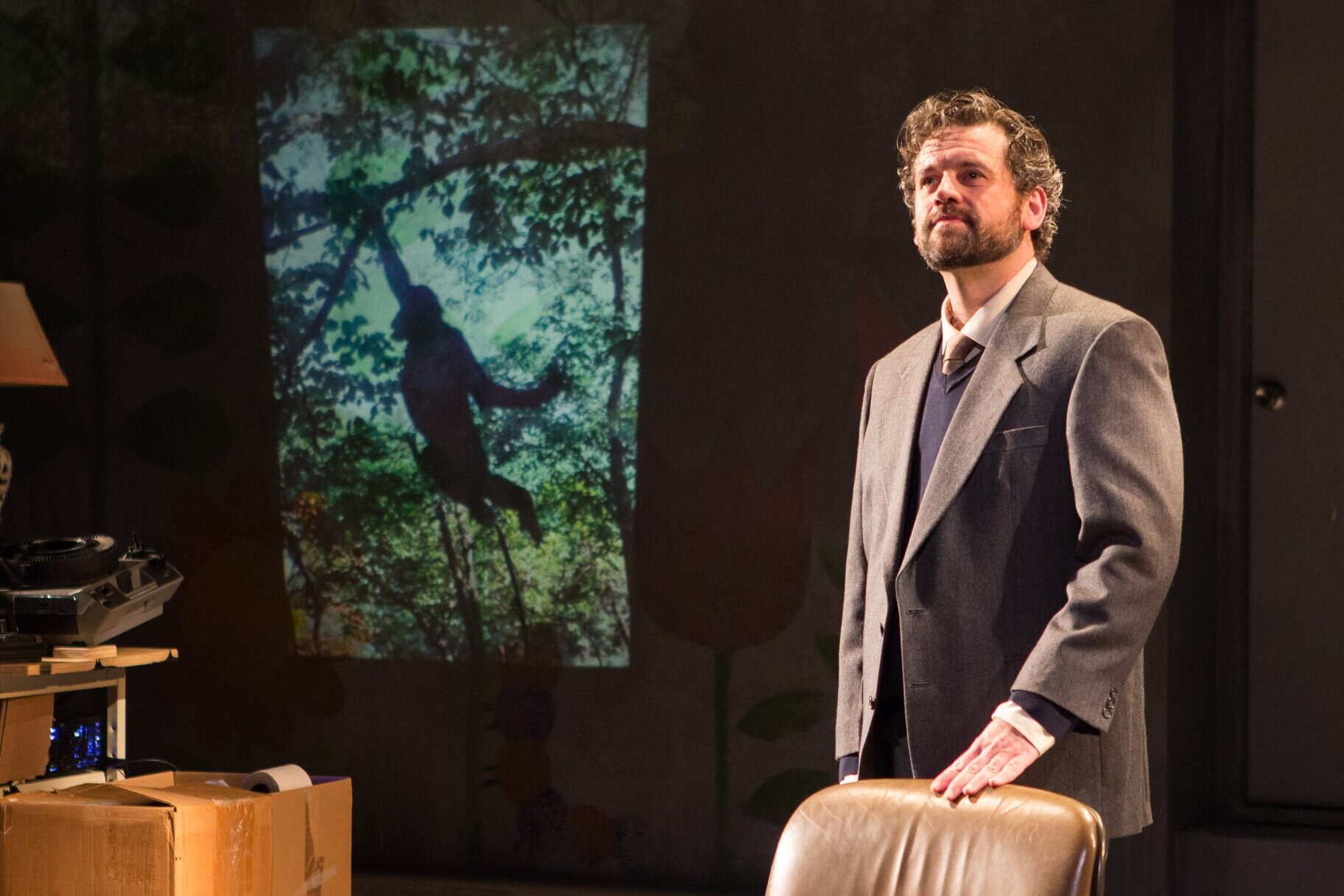PREMIERES
LUCY
LUCY
Composed by JOHN GLOVER
libretto by KELLEY ROURKE
"I often have the feeling that the deeper I look into Lucy the more I may see of my own basic nature." — Dr. Maurice Temerlin
Inspired by true events, Lucy conveys the powerful story of psychologist Maurice Temerlin, who, along with his wife Jane, adopted a day-old chimpanzee in 1964. Naming her Lucy, their intention was to raise this chimpanzee "as much as possible as though she were a human being." Lucy learned to dress herself, eat with silverware, make tea for guests, look at magazines, communicate through sign language, and enjoy cocktails. As Temerlin struggles to hold on to memories of a happy, albeit wildly unconventional, family life, documentation from the experiment challenges him to come to terms with the project's ultimate consequences.
In the 1960s, psychotherapist and chimpanzee breeder Dr. William Lemmon began a series of experiments out of his Institute for Primate Studies in Norman, Oklahoma. Lucy was one of a number of infant chimps sent to live in species isolation with Lemmon’s students, patients and colleagues. Decades later, Lucy’s remarkable story was the centerpiece of an episode of WNYC’s Radiolab.
Lucy remained with her human “family” for well over a decade – far longer than any other “cross-fostered” chimp. During that period Lucy’s adoptive “father,” the psychotherapist Maurice Temerlin, walked an interesting line. His intent was to study the effects of raising a chimp in an “enriched environment,” providing a childhood that mirrored, as closely as possibly, that of his biological son. In other words, the experiment required he approach Lucy not as a dispassionate scientist, but as a loving father. In his memoir, Lucy: Growing Up Human, Temerlin’s genuine affection for his daughter is obvious. He proudly relates stories of his daughter’s accomplishments, describing and analyzing her interactions — with family members, other humans, a kitten, a herd of cattle — in a series of episodes that are by turns touching, amazing, hilarious and disturbing. He is particularly fascinated by her experimental interactions with members of other species. "I often have the feeling,” wrote Temerlin, “that the deeper I look into Lucy, the more I see of my own basic nature."
Actual events described in Temerlin’s memoir serve as a starting point for Lucy, a fictional memory opera in which we meet Temerlin alone in his office, some decades after he made the decision to bring Lucy into his home. As he struggles to hold on to his story of a happy, if unconventional, family life, additional documentation both supports and challenges his efforts.
Lucy is a one-act monodrama. A chamber ensemble of violin, cello, bass clarinet, piano and toy piano combines, breaks apart, and recombines to evoke shifting memories and feelings, from the savage to the subtle. While Lucy’s presence is summoned in sound and story, the baritone is the only live primate in the piece.
Information
Duration 65 minutes, no intermission
Commission and Development Commissioned by Milwaukee Opera Theater. Developed by The American Opera Project, Milwaukee Opera Theatre, and Nautilus Theater's Rough Cuts Program.
Premiere Milwaukee Opera Theatre, November 2014
Roles (1) Baritone
Instrumentation (6) bass clarinet, violin, cello, piano, toy piano, and electronics
Publisher Staged performances of this work require licensing through the creators.
Partner website Lucy the opera
MEDIA
Live recording from the world premiere of Lucy at Milwaukee Opera Theatre is available for purchase here
Photos from the Urban Arias (Washington D.C.) performance of Lucy
PRESS
“Composer John Glover and librettist Kelley Rourke have crafted “Lucy,” which premiered in Milwaukee in 2014, skillfully — Rourke by sidestepping the question of the moral obliviousness of the undertaking and offering a mix of objectivity, emotion and humor, and Glover by managing to flesh out the single role of Maurice Temerlin, Lucy’s “father,” with musical incarnations of the growing chimp and the physical and emotional pleasure and chaos she leaves in her trail.” - Washington Post
"...in Kelley Rourke's and John Glover's haunting new chamber opera.... 'Lucy' becomes a potent exploration of the divide between the human and non-human." - Milwaukee Mag
"...nothing in the world of opera, however, could possibly prepare anyone for the absolutely mesmerizing Milwaukee Opera Theater production of 'Lucy.'" - OnMilwaukee
"Lucy the chimpanzee's life makes for compelling art at Atlas." - The Washington Post
"Glover’s music is well crafted, varied and entertaining, and the libretto by Kelley Rourke is plainspoken and objective… a poignant and thought-provoking work, one well worth hearing.” - Opera News
“Rourke is a gifted librettist, one of the best. She understands that words in opera need to be terse and offer singable vowels. She also knows what opera can do better than any other performance form: to provide ambiguity and multiplicity of perspective through repetition.” - DC Theatre Scene




